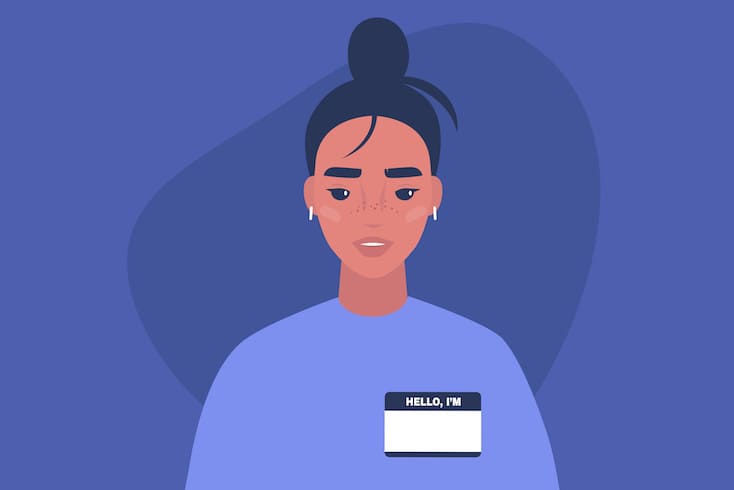April 26, 2021
By Natalie Dale, M.D.

It wasn’t until I had to leave medicine that I realized my identity was interwoven with my profession. I’d wanted to be a doctor since I was a little girl helping to deliver baby alpacas on our family farm. I delighted in telling people that I was pre-med, that I was a medical student, that I had matched into my top-choice neurology residency.
So, when I was diagnosed with bipolar II disorder just weeks before graduation, I told myself that it didn’t matter. I was on the cusp of fulfilling a lifelong dream, and I would let nothing get in my way.
The depression hit within days of starting residency. After a few weeks, I began having difficulty reading. I’d sit in the call room with a piece of paper pressed to the computer screen to force my eyes to follow the lines of text. My test scores dropped from the top percentile to the bottom. I started having trouble following conversations and remembering things I’d done earlier that day. I made mistakes — dangerous ones — and was put on medical leave.
I was determined to get back to residency as soon as possible. I grudgingly attended a day-program and doodled clocks on the margins of my worksheets. After the mandated eight weeks, I returned to work. Two months later, I was put on leave again. It became a pattern: I’d return to residency, only to break down within a few weeks.
By this point, my self-confidence shattered. I was the valedictorian, the type-A overachiever who always knew the answer. I was good at things, especially medicine. Except, I wasn’t. Not anymore.
While my peers navigated their intern year and graduated to junior residents, I was unable to complete even a single month. For the first time in my life, I’d been left behind.
After a year, it was clear that I wasn’t going to be able to finish intern year, never mind the four-year neurology residency. Well, it was clear to the people around me; I’d stuck my head in the sand. It took another six months of cajoling by my friends, family and therapists before I finally saw what was so obvious to everyone else: that every attempt to return to medicine was a risk to my health and safety.
I walked into my program director’s office and — somehow still dry-eyed — told him I was leaving for good. He didn’t look surprised. But when I stepped out of his office, I felt like I’d been hit with a brick to the gut. Ten minutes ago, I’d been a doctor with a promising career. What was I now? Who was I now?
A few weeks later, I flew to visit my parents in Mexico. As I settled into my seat, a kindly older man sat beside me and started chatting. He asked what I did for a living, and I burst into tears. For the first time in my life, I didn’t have an answer.
I tried on a lot of different hats, but none fit. If I said I was disabled, I’d get looked up and down, as if they were trying to figure out what was wrong with me. If I said I was a physician, they’d ask my specialty which, since I hadn’t gotten beyond intern year, I didn’t have. Finally, I started saying I was a writer.
Writing started out as a hobby. During a hypomanic episode, I had an idea for a novel, so I wrote it. By the time I officially left residency, I’d written two novels and several short stories. Writing helped me work through my feelings of loss and insecurity and gave me something to plan my days around. I thought it could be something I might pursue as a second career.
But there was one big problem: I wasn’t a very good writer.
I was a scientist. I knew how to write lab reports, not stories. Worse, the competition for traditional publishing was much steeper than I’d ever imagined. I couldn’t get so much as a single short story published.
Every time I had to tell a stranger that I was an unpublished writer, I felt my heart shrink another size. Then, while sulking in a corner at a party, someone asked me what I loved instead of what I did. We started talking about writing and music and the joy of seeing a baby alpaca take its first wobbly steps. I enjoyed that conversation — perhaps the first time I’d enjoyed a conversation with a stranger since I was diagnosed. And it made me realize something important: I am not defined by my career.
My lack of concrete accomplishments does not diminish my inherent worth. I have redefined my normal, reclaimed my sense of worth. From the ashes of my old mindset, I’ve built a new identity, one less concerned with the concrete trappings of success than with the wholeness of my being.
I have learned how to make mistakes, how to ask for help, and how to love myself through rejection and failure. Though I would never have chosen this path on my own, I am better, stronger and more compassionate for it.
Natalie Dale, M.D., is a disabled former neurologist who left medicine because of her struggle with bipolar disorder. She has one short story published through “Breath & Shadow” and another forthcoming through “Aurelia Leo Originals.” In her spare time, she loves board games, hiking, playing violin and all things alpaca. Website: nataliedaleauthor.com
We’re always accepting submissions to the NAMI Blog! We feature the latest research, stories of recovery, ways to end stigma and strategies for living well with mental illness. Most importantly: We feature your voices.
LEARN MORENAMI HelpLine is available M-F, 10 a.m. – 10 p.m. ET. Call 800-950-6264,
text “NAMI” to 62640, or email. In a crisis, call or text 988 (24/7).